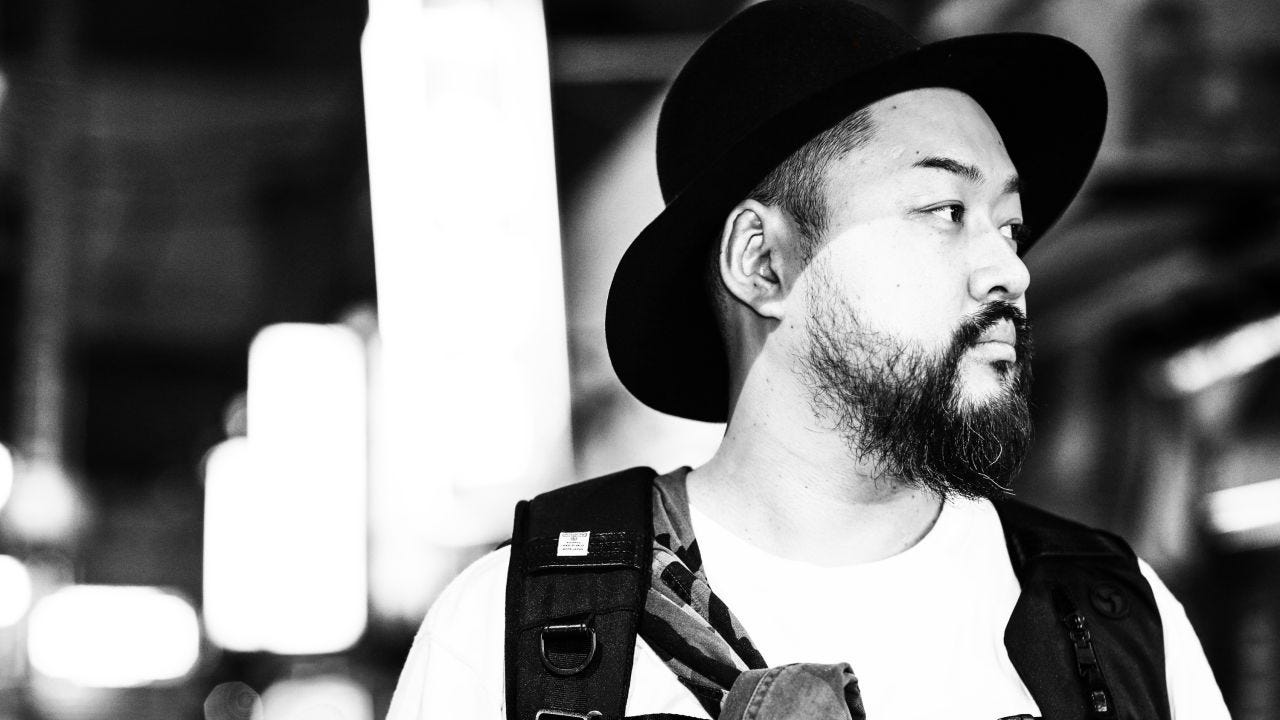Throwback Files: Grooveman Spot
My 2009 interview with the Japanese producer/DJ Grooveman Spot.
Selected Works is a weekly (usually) newsletter by the Te Whanganui-a-Tara, Aotearoa (Wellington, New Zealand) based freelance music journalist, broadcaster, copywriter and sometimes DJ Martyn Pepperell, aka Yours Truly. Most weeks, Selected Works consists of a recap of what I’ve been doing lately and some of what I’ve been listening to and reading, paired with film photographs I’ve taken + some bonuses. All of that said, sometimes it takes completely different forms.
In 2009, I interviewed the Japanese producer/DJ Grooveman Spot for a now-defunct weekly New Zealand gig guide/street press giveaway called Groove Guide. As it goes, the interview was intended to promote a series of nightclub shows he played around the country that year. Looking at my notes, I see that Kenji Sakajiri from the Japanese record label Wonderful Noise joined him on the tour as well. It’s worth noting that over the years that followed, Kenji has released music from numerous New Zealand acts like Electric Wire Hustle, Lord Echo, Julien Dyne and Frank Booker in Japan.
On 'Time is of the Essence' (featuring Grap Luva) off his debut album Eternal Development, far eastern beat architect Grooveman Spot (aka DJ Kou-G) channels the essence of early 90s golden era NYC boombap. More than just channelling the essence though, he flips it through a distinctly Japanese soul'n'beats filter, marking it out as the work of a musician who had at the time, in his words had just, "become borderless musically."
Juxtaposing straight-ahead kick/snare rap drums with wistful higher register ivory-toned piano samples and rhyme technique expounding rap lyrics from Grap Luva (Pete Rock's older brother), 'Time is of the Essence' is essentially a contemporary take on a classic sound. A contemporary take which proves once again that the five boroughs of The Big Apple, while existing as physical locations within New York, also exist internationally as mental locations within the hearts and minds of the hip-hop faithful from the East Coast of America to Sendai in Japan.
As Kou-G explains via email in his limited English, "I'm from Sendai City [in Japan], where Mitsu the Beats and DJ Kentaro used to live. And I'm living in Tokyo now." A long-time Black music enthusiast, Kou-G caught the music bug as a teenager, initially through dance, after watching the likes of MC Hammer and Heavy D. Next came crate-digging. He explains, "I went to Tower Records in my hood every week and kept digging for rap, hip hop and soul CD's there."
Citing some of his early musical heroes as "Bobby Brown, Public Enemy, Michael Jackson & Teddy Riley," Kou-G also looked up to Japanese artists, "DJ Muro and DJ Watarai, and Rhymester." At age fifteen, he realised he wanted to become a DJ after listening to bootleg mixtapes of Funkmaster Flex's NYC radio shows, dived in headfirst and hasn't looked back since. Forming notorious Japanese hip-hop duo ENBULL with MC U-Zipplain in 1996, Kou-G quickly progressed into sampler driven beat-production after falling in love with the music of classic east coasters Gangstarr and D.I.T.C (Diggin In The Crates).
He elaborates, "It was so natural to make beats when I started DJing. When I was eighteen, I made a loop with a Bob James sample on an Audio Technica disco mixer. It has a cheap sampler that can sample only two seconds. I added a drum break by double trick on that loop I made, and recorded that. Then I started to investigate beat science from DJ Premier and Pete Rock. I was kind a quick learner for that and bought a MPC 2000, made beats everyday and let my partner MC U-Zipplain from ENBULL listen my beats and record raps on my beats."
Aside from his work with ENBULL and his work as a solo artist under the Grooveman Spot moniker, Kou-G is affiliated with Jazzy Spot, a world-renowned boutique record store/music label located in Shibuya, Tokyo; and the label on which he released Eternal Development in 2007. "We been friends since before they established Jazzy Sport," he writes. "I think every crew member understands good music and digs good music. I was hooked up by Raythought (MC, shop manager) as an official member of Jazzy Sport. Now I'm working on the production side of things, and as a Jazzy Sport music shop assistant sometimes."
Late September, Kou-G is playing two shows in New Zealand under his Grooveman Spot alias and is bringing a special friend along for the ride, Kenji Sakajiri, the owner of Osaka-based record label Wonderful Noise, an internationally distributed imprint which has recently become the Japanese home to New Zealand soul'n'beats artists Electric Wire Hustle, Julien Dyne and Pacific Heights. It would seem that the time has come. Japanese beat music (for example: DJ Krush) has been on the New Zealand musical radar for years now, and finally, this interest has metamorphosed into a metaphorical two-way street.
Soul'n'beats, future soul, wonky, instrumental hip-hop. Descriptive terms get thrown around and come and go like the morning newspaper delivery within these interconnected musical worlds. And who would Kou-G be if he didn't have his own definition to throw into the mix. His final conclusive line, "my music is 'dope & funk', rooted from hip-hop."
FIN.



